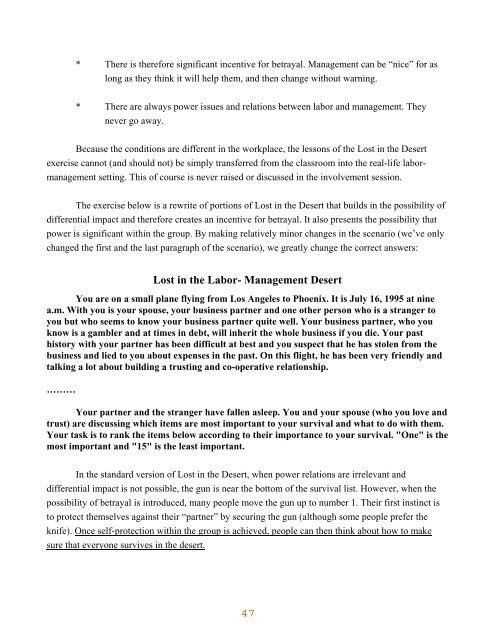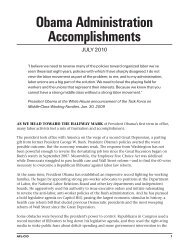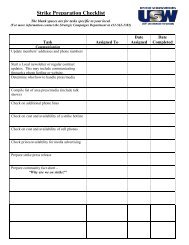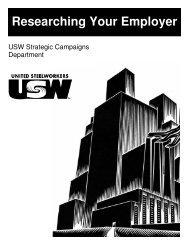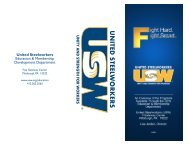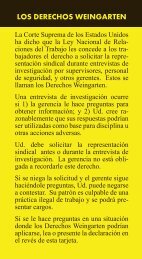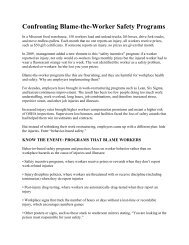Union Approach to Health and Safety: - United Steelworkers
Union Approach to Health and Safety: - United Steelworkers
Union Approach to Health and Safety: - United Steelworkers
Create successful ePaper yourself
Turn your PDF publications into a flip-book with our unique Google optimized e-Paper software.
* There is therefore significant incentive for betrayal. Management can be “nice” for as<br />
long as they think it will help them, <strong>and</strong> then change without warning.<br />
* There are always power issues <strong>and</strong> relations between labor <strong>and</strong> management. They<br />
never go away.<br />
Because the conditions are different in the workplace, the lessons of the Lost in the Desert<br />
exercise cannot (<strong>and</strong> should not) be simply transferred from the classroom in<strong>to</strong> the real-life labormanagement<br />
setting. This of course is never raised or discussed in the involvement session.<br />
The exercise below is a rewrite of portions of Lost in the Desert that builds in the possibility of<br />
differential impact <strong>and</strong> therefore creates an incentive for betrayal. It also presents the possibility that<br />
power is significant within the group. By making relatively minor changes in the scenario (we’ve only<br />
changed the first <strong>and</strong> the last paragraph of the scenario), we greatly change the correct answers:<br />
Lost in the Labor- Management Desert<br />
You are on a small plane flying from Los Angeles <strong>to</strong> Phoenix. It is July 16, 1995 at nine<br />
a.m. With you is your spouse, your business partner <strong>and</strong> one other person who is a stranger <strong>to</strong><br />
you but who seems <strong>to</strong> know your business partner quite well. Your business partner, who you<br />
know is a gambler <strong>and</strong> at times in debt, will inherit the whole business if you die. Your past<br />
his<strong>to</strong>ry with your partner has been difficult at best <strong>and</strong> you suspect that he has s<strong>to</strong>len from the<br />
business <strong>and</strong> lied <strong>to</strong> you about expenses in the past. On this flight, he has been very friendly <strong>and</strong><br />
talking a lot about building a trusting <strong>and</strong> co-operative relationship.<br />
………<br />
Your partner <strong>and</strong> the stranger have fallen asleep. You <strong>and</strong> your spouse (who you love <strong>and</strong><br />
trust) are discussing which items are most important <strong>to</strong> your survival <strong>and</strong> what <strong>to</strong> do with them.<br />
Your task is <strong>to</strong> rank the items below according <strong>to</strong> their importance <strong>to</strong> your survival. "One" is the<br />
most important <strong>and</strong> "15" is the least important.<br />
In the st<strong>and</strong>ard version of Lost in the Desert, when power relations are irrelevant <strong>and</strong><br />
differential impact is not possible, the gun is near the bot<strong>to</strong>m of the survival list. However, when the<br />
possibility of betrayal is introduced, many people move the gun up <strong>to</strong> number 1. Their first instinct is<br />
<strong>to</strong> protect themselves against their “partner” by securing the gun (although some people prefer the<br />
knife). Once self-protection within the group is achieved, people can then think about how <strong>to</strong> make<br />
sure that everyone survives in the desert.


